The Intel Core i9-9900K at 95W: Fixing The Power for SFF
by Ian Cutress on November 29, 2018 8:00 AM ESTCPU Performance: Office Tests
The Office test suite is designed to focus around more industry standard tests that focus on office workflows, system meetings, some synthetics, but we also bundle compiler performance in with this section. For users that have to evaluate hardware in general, these are usually the benchmarks that most consider.
All of our benchmark results can also be found in our benchmark engine, Bench.
PCMark 10: Industry Standard System Profiler
Futuremark, now known as UL, has developed benchmarks that have become industry standards for around two decades. The latest complete system test suite is PCMark 10, upgrading over PCMark 8 with updated tests and more OpenCL invested into use cases such as video streaming.
PCMark splits its scores into about 14 different areas, including application startup, web, spreadsheets, photo editing, rendering, video conferencing, and physics. We post all of these numbers in our benchmark database, Bench, however the key metric for the review is the overall score.
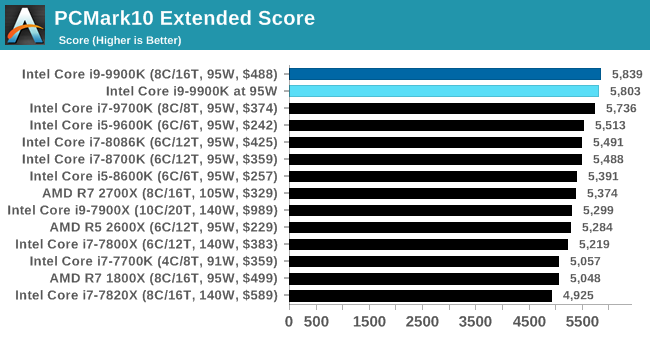
PCMark10 is more forgiving, as it has lots of pauses and only a few full-on power tests, emphasising single core speed. There isn't much lost when in 95W mode here.
Chromium Compile: Windows VC++ Compile of Chrome 56
A large number of AnandTech readers are software engineers, looking at how the hardware they use performs. While compiling a Linux kernel is ‘standard’ for the reviewers who often compile, our test is a little more varied – we are using the windows instructions to compile Chrome, specifically a Chrome 56 build from March 2017, as that was when we built the test. Google quite handily gives instructions on how to compile with Windows, along with a 400k file download for the repo.
In our test, using Google’s instructions, we use the MSVC compiler and ninja developer tools to manage the compile. As you may expect, the benchmark is variably threaded, with a mix of DRAM requirements that benefit from faster caches. Data procured in our test is the time taken for the compile, which we convert into compiles per day.
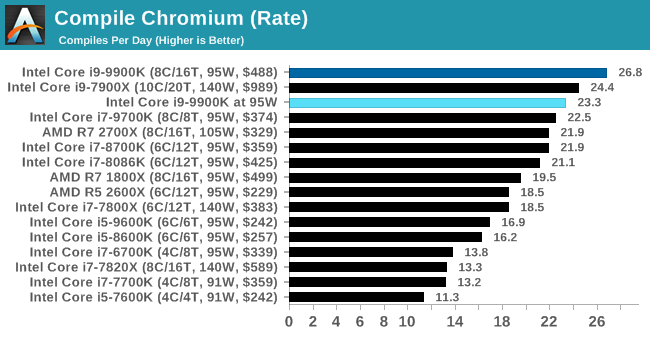
The 95W mode causes a small decrease in performance in our compile test, again moving it within a small margin to the Core i7-9700K.
3DMark Physics: In-Game Physics Compute
Alongside PCMark is 3DMark, Futuremark’s (UL’s) gaming test suite. Each gaming tests consists of one or two GPU heavy scenes, along with a physics test that is indicative of when the test was written and the platform it is aimed at. The main overriding tests, in order of complexity, are Ice Storm, Cloud Gate, Sky Diver, Fire Strike, and Time Spy.
Some of the subtests offer variants, such as Ice Storm Unlimited, which is aimed at mobile platforms with an off-screen rendering, or Fire Strike Ultra which is aimed at high-end 4K systems with lots of the added features turned on. Time Spy also currently has an AVX-512 mode (which we may be using in the future).
For our tests, we report in Bench the results from every physics test, but for the sake of the review we keep it to the most demanding of each scene: Cloud Gate, Sky Diver, Fire Strike Ultra, and Time Spy.
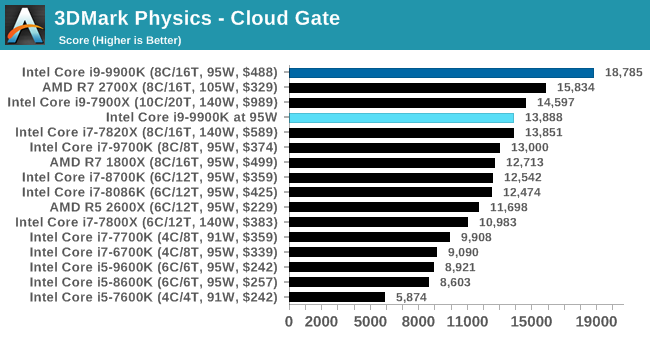
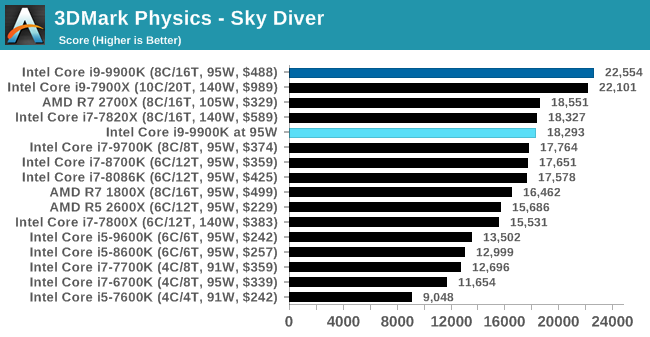
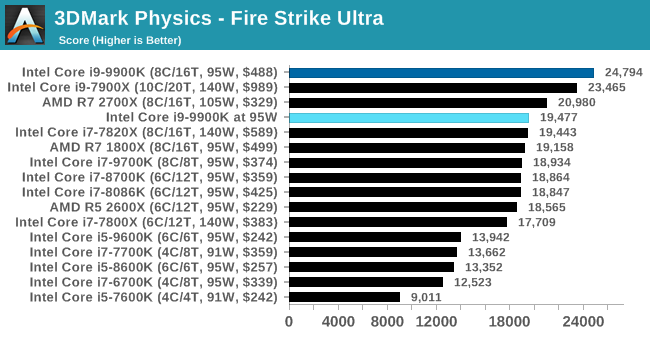
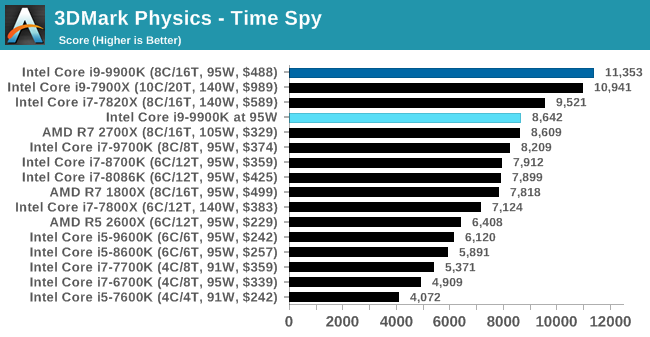
GeekBench4: Synthetics
A common tool for cross-platform testing between mobile, PC, and Mac, GeekBench 4 is an ultimate exercise in synthetic testing across a range of algorithms looking for peak throughput. Tests include encryption, compression, fast Fourier transform, memory operations, n-body physics, matrix operations, histogram manipulation, and HTML parsing.
I’m including this test due to popular demand, although the results do come across as overly synthetic, and a lot of users often put a lot of weight behind the test due to the fact that it is compiled across different platforms (although with different compilers).
We record the main subtest scores (Crypto, Integer, Floating Point, Memory) in our benchmark database, but for the review we post the overall single and multi-threaded results.
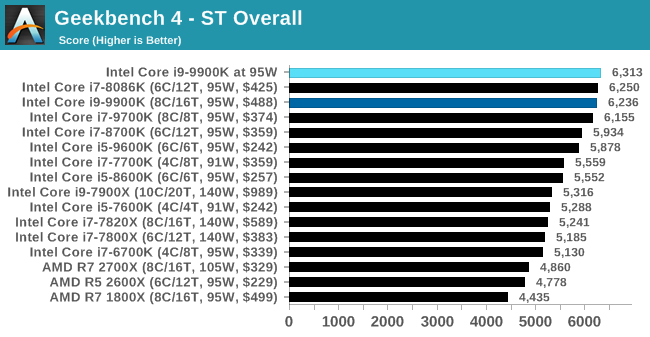
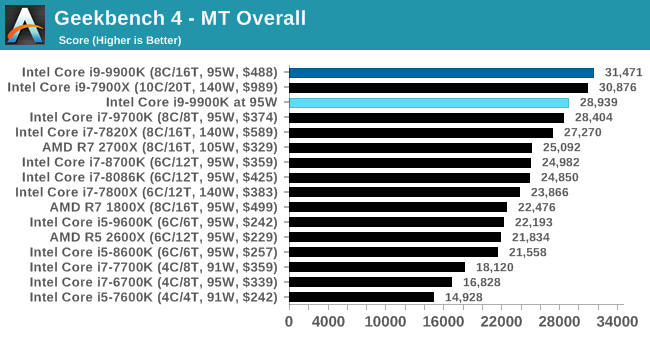










101 Comments
View All Comments
urbanman2004 - Thursday, November 29, 2018 - link
Yeah, the 9900K is the latest and greatest when it comes to mainstream CPU's, but at its current pricing you're better off purchasing a more value oriented CPU such as the 8700K to get more bang for your buck. Intel has been losing their sh!t as of late ever since AMD's Ryzen has them on their heels.AlyxSharkBite - Thursday, November 29, 2018 - link
The 9900K is awesome if you build a rig that can keep it cool when overclocked. But otherwise yeah an 8700K is a better choice or for bang for buck the 2700X is good4800z - Thursday, November 29, 2018 - link
It's not that hard to cool it. Just need a big noctua or an AIO.TheinsanegamerN - Thursday, November 29, 2018 - link
It still runs high 90C under OC on such coolers. The only way to keep it running at a 5 GHz OC with with a 360mm rad, and even then just barely.The 9900k is the hardest intel to cool since the pentium DEE
4800z - Thursday, November 29, 2018 - link
If you want value stop playing games and get a part time job so you can have more money in your pocket. The 9900k is only a few hundred dollars more. THat's not much spread over years.sa666666 - Thursday, November 29, 2018 - link
Found the Intel shill/apologist. Not everyone has unlimited funds to spend like that, and even if they could afford the CPU, what about the power to run it? This CPU is very power-hungry and expensive, and insulting users that don't have a lot of money (or have a better sense of how to properly budget it) won't change that fact.schujj07 - Thursday, November 29, 2018 - link
Very true. Has to justify the reason for spending an arm and a leg on his/her new space heater. 4800z while the CPU is $200 more expensive, you also need the $70+ cooler, you have to have the expensive z390 motherboard that adds another $70 onto the build, your room is going to be warmer so that will increase your cooling costs, and drawing 77% more power means you are going to increase your electric bill. All these costs add up and unless you are able to purchase this on a credit card with 0% interest or have saved up for a long time, the extra $400 is going to make a huge difference. Also someone could go with the 2700X or 8700K and use the extra $400 for a nice upgrade on their build, where said person would have gotten a RTX2080 not s/he can afford a RTX2080Ti.TEAMSWITCHER - Thursday, November 29, 2018 - link
He's not wrong. The 9900K is closer the Thread Ripper in many benchmarks than Ryzen is to the 9900K, and at the same time closer to Ryzen in cost. While billed as a gaming processor, the 9900K is great for content creators. Unless you have a specific need for HEDT platform capabilities (RAM or PCIe lanes) the 9900k would get the job done for less money.Targon - Thursday, November 29, 2018 - link
And if you just wait until March of 2019, Ryzen 3rd generation will probably meet or beat the performance of the 9900k for $330. So your $200+ higher price will only be for 4-5 months of having superior performance before the new AMD will be considered faster.HollyDOL - Saturday, December 1, 2018 - link
I know a person holding to a similar philosophy. He still runs Athlon XP, always waiting for the next generation beating the current one.